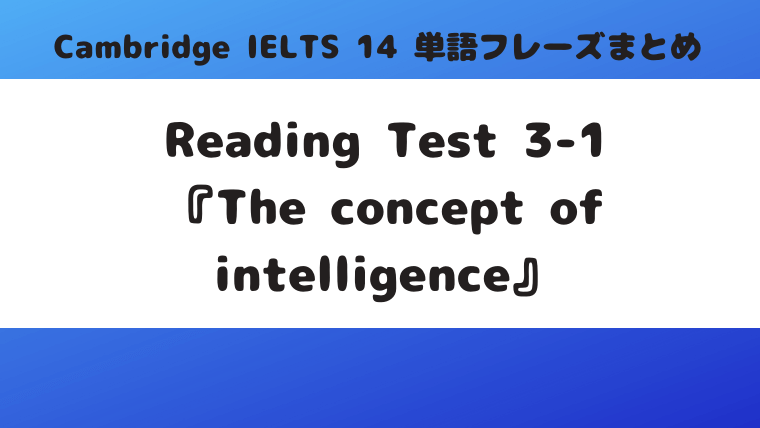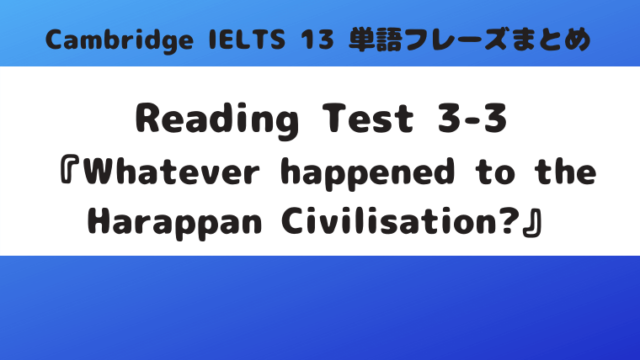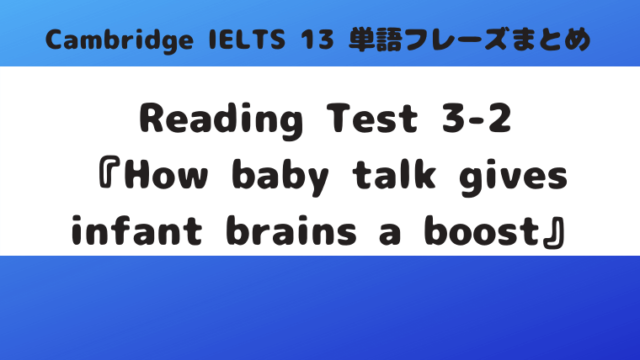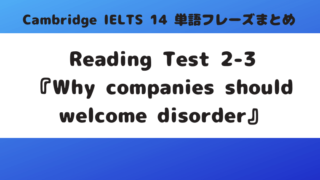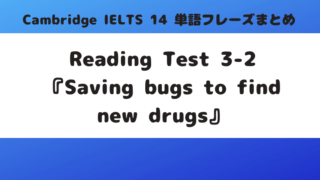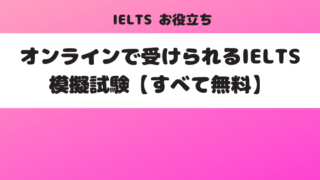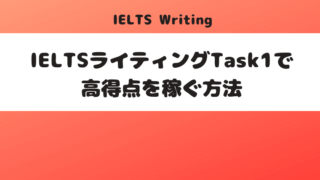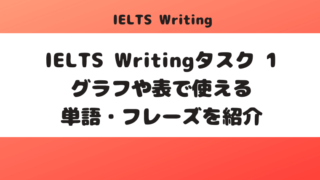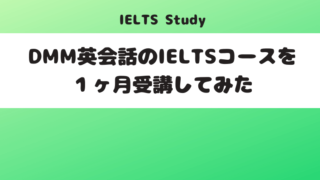「Cambridge IELTS 14」Reading Test3-1『The concept of intelligence』の単語・フレーズをまとめました。
私がIELTS Readingの単語・まとめを行う理由は「Cambridge IELTS Reading単語・フレーズまとめ」からご覧ください。
Reading Test 3 Passage 1:The concept of intelligence
- unconscious
adjective /ʌnˈkɒn.ʃəs/
・in the state of not being awake and not aware of things around you, especially as the result of a head injury:
・An unconscious thought or feeling is one that you do not know you have:
1 意識を失った, 意識不明の
2 <感情などが> 無意識の
3 unconscious of something
<…>に気づいていない
4 <行為が> 無意識の - implicit
adjective /ɪmˈplɪs.ɪt/
・suggested but not communicated directly:
1 <脅迫・批判・メッセージなどが> 暗に示された, 含意された, 暗黙の
反意 explicit, overt
2 〘フォーマル〙 内在的な, 潜在的な
3 <信頼・信用などが> 絶対的な, 完全な - conceptualize
verb /kənˈsep.tʃu.ə.laɪz/
to form an idea or principle in your mind:
…を概念化する, …について特定の概念[見解]を抱く - perceive
verb /pəˈsiːv/
to come to an opinion about something, or have a belief about something:
to see something or someone, or to notice something that is obvious:
1 〘書き言葉〙 <事柄> をとらえる, 理解する
2 〘フォーマル〙 <わかりにくい事など> に気づく
3 〘専門〙 <物> を目で知覚できる - determine
verb /dɪˈtɜː.mɪn/
・to control or influence something directly, or to decide what will happen:
・formal to make a strong decision:
・formal to discover the facts or truth about something:
1 <原因・料金など> を確定する, 特定する
同意 establish
2 …を決定する, 左右する
3 <日取りなど> を決める, 定める
4 determine to do something
〘フォーマル〙 <…>することを決心する - correction
noun /kəˈrek.ʃən/
・a change made to something in order to correct or improve it, or the action of making such a change:
・finance & economics specialized (also market correction) a change in prices in a financial market, especially when they go down after a period of being too high in relation to the real situation in a company, the economy, etc.:
・old-fashioned punishment of a type that is intended to improve bad behaviour
・the set of methods available for punishing and treating people who have committed crimes:
1 《C》 訂正, 修正, 校正, 添削
2 《U》 訂正[修正,校正,添削]すること
3 《U》 〘話〙 (自分の発言を改めて) 訂正します
4 《C, U》 (株価の急騰後の) 反発
5 《C, U》 米 こらしめ, 更生, 矯正 - cognitive
adjective /ˈkɒɡ.nə.tɪv/
connected with thinking or conscious mental processes
1 認識の, 認知に関する
2 《名の前でのみ》 認知の - ultimately
adverb /ˈʌl.tɪ.mət.li/
・finally, after a series of things have happened:
・used to emphasize the most important fact in a situation:
1 最後に, 結局(は)
2 《文修飾》 最終的には, 結局のところ
3 最終的に - framework
noun /ˈfreɪm.wɜːk/
・a supporting structure around which something can be built
・a system of rules, ideas, or beliefs that is used to plan or decide something
1 《C通例単数形で》 a framework for something
<判断・決定など>の基本概念, 基盤
2 the framework of something
<制度など>の枠組み, 体制
同意 structure
3 (建物・車などの) 骨組み - reveal
verb /rɪˈviːl/
・to make known or show something that is surprising or that was previously secret:
・to allow something to be seen that, until then, had been hidden:
1 <隠されていた物事など> を明らかにする, 暴露する
2 <隠れていた物> を見せる - correspondence
noun/ˌkɒr.ɪˈspɒn.dəns/
・letters, especially official or business letters:
・the action of writing, receiving, and reading letters, especially between two people
1 《U》 (公的・業務上などの) 通信文, 往復書簡
2 《U, a/the ~》 文通
3 《C, U》 対応, 一致 - take into account
<…>を考慮する, 考慮に入れる - supplementation
noun /sʌp.lɪ.menˈteɪ.ʃən/
pills or drinks containing substances people usually get from food that are given to patients who do not weigh enough or who are not able to take in enough of these substances in food:
1 補充(するもの), 補足
2 (栄養)補給剤
3 (書籍の) 補遺, 別巻
4 (新聞の) 特集版
5 (ホテル,サービス,乗車券などでの) 追加料金 - expansion
noun /ɪkˈspæn.ʃən/
the increase of something in size, number, or importance
1 《C, U》 (大きさ・範囲などの) 拡大, 拡張, (数量などの) 増大
反意 contraction
2 《C, U》 (事業などの) 拡大, 発展
3 《U》 領土拡張
4 《C》 (考え・話などを) 発展させたもの, 詳しい説明
5 《C, U》 〘専門〙 (数学の) 展開(式) - elucidate
verb /iˈluː.sɪ.deɪt/
to explain something or make something clear
a) 《他》 …を解明する
b) 《自》 解明する - schooling
noun /ˈskuː.lɪŋ/
education at school
学校教育 - loosely
adverb /ˈluːs.li/
・in a way that is not firmly held or attached:
・not exactly:
・not tightly
1 緩く, だらりと
2 大まか[大ざっぱ]に, 厳密ではなく
3 あまり束縛せずに, 緩く - statesmen
noun /ˈsteɪt.smən/
an experienced politician, especially one who is respected for making good judgments
(特に尊敬を集める) 政治家, 政府首脳 - keep somebody in line
<人>を行儀よくさせる - irresponsive
(治療などに対して) 手ごたえ[反応]のない 同意 unresponsive 反意 responsive - chaos
noun /ˈkeɪ.ɒs/
・a state of total confusion with no order
1 混沌(こんとん), 無秩序, 大混乱
• scenes of chaos
2 カオス ((天地創造以前の混とん)) - avail
noun /əˈveɪl/
use, purpose, advantage, or profit:
to no / little avail
まったく[ほとんど]役に立たない, 無駄になって - foster
verb /ˈfɒs.tər/
・to take care of a child, usually for a limited time, without being the child’s legal parent:
・to encourage the development or growth of ideas or feelings:
1 《他》 〘フォーマル〙 <技術・精神など> をはぐくむ, 育成[促進]する
同意 encourage, promote
2 a) 《他》 <他人の子供> を里親として養育する
b) 《自》 里親として養育する → adopt - competence
noun /ˈkɒm.pɪ.təns/
the ability to do something well:
1 《U》 能力, 力量
反意 incompetence
2 《U》 〘法〙 法的権限, 権能
3 《C》 (competency とも) 〘フォーマル〙 (特定の仕事をする) 技能
4 《U》 (competency とも) 〘法〙 正常な知能
5 《U》 〘フォーマル〙 (理解・知識などの) 範囲 - jury
noun /ˈdʒʊə.ri/
・a group of people who have been chosen to listen to all the facts in a trial in a law court and to decide if a person is guilty or not guilty, or if a claim has been proved:
・a group of people chosen to decide the winner of a competition
1 《C,英では複数扱いも可》 陪審, 陪審(員)団
2 《U》 陪審制度
3 《C》 (競技会などの) 審査員団 - substantial
adjective /səbˈstæn.ʃəl/
・large in size, value, or importance:
・formal relating to the main or most important things being considered:
1 <数量などが> かなりの, 相当な
2 重要な, 価値のある
3 〘特に書き言葉〙 <食事が> たっぷりした, <食べ物が> 腹ごたえのある
4 《名の前でのみ》 〘特に書き言葉〙 (家具・家などが) しっかりした作りの
5 〘やや古〙 (富などにより) 強大な影響力を持つ - presupposition
noun /ˌpriː.sʌp.əˈzɪʃ.ən/
something that you believe is true without having any proof:
1 《C》 前提(条件), 仮定した内容 同意 assumption
2 《U》 仮定 - experimental
adjective /ɪkˌsper.ɪˈmen.təl/
relating to tests, especially scientific ones:
1 《名の前でのみ》 実験の, 実験に基づく
2 実験[試験]的な - assumption
noun /əˈsʌmp.ʃən/
something that you accept as true without question or proof
1 《C》 仮定, 想定, 思い込み
2 《U》 〘フォーマル〙 (責任などの) 引き受け, (権力などの) 掌握
3 the Assumption 聖母被昇天
